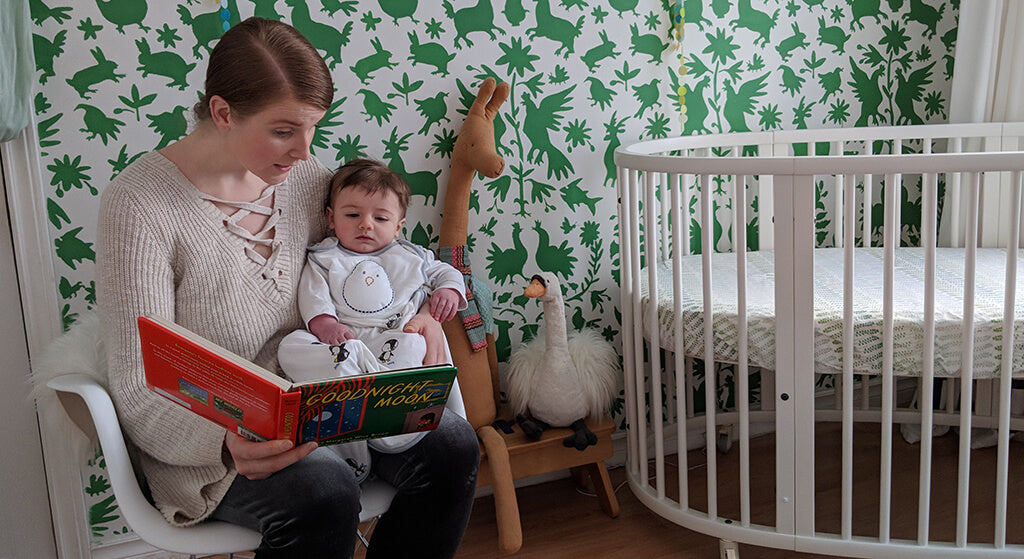Shopping Cart
Getting your baby back to sleep through the night is a common challenge among parents. As a newborn, babies need to wake every few hours to feed since their tiny tummies aren’t big enough to keep them full throughout the night. However, as your baby grows they need those nighttime feedings less. This is usually when parents expect their babies to start sleeping through the night, but things don’t always turn out as expected, leaving parents utterly exhausted and searching for solutions.
In This Article
How to get your baby to sleep through the night?
Teach your baby to self-soothe
Start weaning the night feedings
Stick to an appropriate bedtime
Common Questions from New Parents
The answer to the age old question when do babies start sleeping through the night is less straightforward than parents expect. Believe it or not, sleep is actually a learned skill. Babies need to learn how and when to sleep before sleeping through the night. Once they're ready, our 8 tips will help your little one start sleeping for those longer stretches.
To understand how to get your baby to sleep through the night, you first need to know if your baby is able to sleep through the night. |
You can also help set the stage for a good night's sleep by making sure your baby is cultivating good sleep habits during the day, which will help them sleep better during the night too.

Your baby has to be able to sleep through the night before they can! There are a few milestones they need to reach first, like a decrease in Moro Reflex. Check out our article on When Do Babies Sleep Through the Night to learn if your baby is ready/able to sleep through the night.
|
Better Sleep for You & Your Baby - TIPS |
|
|
Tips |
Arrival |
|
Tip - 1 |
Make sure your baby has active play time, like “tummy time,” during the day. |
|
Tip - 2 |
Respond to your baby’s needs quickly during the day. |
|
Tip - 3 |
Keep the crib in your room and put your baby in when they begin to look tired. This helps them learn to fall asleep on their own. |
|
Tip - 4 |
Keep a journal of when your baby sleeps so you can learn their routine and rest when they do. |
|
Tip - 5 |
Before bedtime, do a few calming activities with your baby, like bathing, gently massaging their muscles, or reading to them. |
|
Tip - 6 |
Talk or sing softly to your baby before they go to sleep. Just the sound of your voice is very soothing to your baby. |
|
Tip - 7 |
Wear a sling or hold your baby while they are awake, keeping the fabric away from their nose and mouth. |
|
Tip - 8 |
If your baby seems restless at bedtime, put them to bed 30 minutes earlier. When overtired, babies can become energetic to fight off sleep. |
|
Tip - 9 |
Play soft music, turn on a fan, or put a ticking clock near your baby’s crib. |
|
Tip - 10 |
Place a warmed towel on the crib sheet and remove it just before placing your baby in the crib on their back. |
If your baby is capable of sleeping through the night but still struggling, there might be an underlying reason your baby isn’t sleeping through the night – OR they’re right on the cusp of starting to sleep through the night. There are several reasons that can cause your baby not to sleep through the night, including sleep regressions, a growth spurt or illness, or the inability to fall asleep independently.
Make nighttime conditions in your baby's bedroom consistent. If they wake up in the middle of the night, the sounds and lights in the room should be the same as when they fell asleep. If you need to feed or change your baby during the night, keep the lights low and the talking to a minimum. Too much stimulation can make it hard for them to settle again. - Webmd.
Whether your baby is experiencing one of the problems above, or they’ve just surpassed the milestones to be able to sleep at night, there are ways you can help your baby (and yourself!) sleep through the night.
Here’s how to get baby to sleep through the night:
1. Establish a bedtime routine.
It’s never too early to get a bedtime routine started. Your bedtime routine should be simple and sustainable, so it’s easy for you to do every night. Even the smallest change in your baby’s routine can leave them feeling off, and suddenly waking more frequently at night. Include calming, soothing activities that your baby seems to respond to, like swaddling and shushing. The bedtime routine can be where you create positive sleep associations for your baby.
2. Teach your baby to self-soothe, which means trying your best to soothe them less.
When your baby wakes in the middle of the night and cries for you, it’s always okay to go check on them. However, try and limit your time in there with them. Make it clear that it’s still time to sleep, not play or eat. Place your hand on their chest for a few moments to calm them, then leave the room (making sure to place your baby on their back to avoid sudden infant death syndrome). The Zen Swaddle and Zen Sack are gently weighted on the chest and sides, which make your baby feel like you’re still there. This can help ease separation anxiety, break the sleep association to be held to fall back asleep, and help your baby learn to self-soothe.
|
|
3. Start weaning the night feedings.
Once you get the okay from your doctor to stop night feedings, you should slowly start to reduce them. In many cases, feeding becomes a sleep association because you fed your baby every time they woke up. Just because that’s no longer necessary, doesn’t mean your baby won’t want it anymore. Slowly wean them off the night feedings (maybe try a dream feed?), feeding them less and not as frequently over a few days or a week to get them used to not feeding every time they wake.
4. Follow a schedule.
Make sure your baby is getting the right amount of daytime sleep to prepare them to get the right amount of nighttime sleep. As newborns, babies can’t differentiate between day and night, they just sleep ‘round the clock. As they get older, they start sleeping longer periods, the longest stretches being at night. If they're sleeping too much during the day they won’t stay asleep as long at night. Take a look at our sample newborn sleep schedules for some suggested guidelines.
5. Keep a calming ambiance.
Ambiance can be everything! Keep the room at a comfortable temperature, make sure it stays dark, and even try adding some white noise in there! The softest of sounds can disturb your baby at night, the white noise will provide a consistent, soothing sound for them to fall asleep to, and it will drown out any other noises happening around the house.

6. Stick to an appropriate bedtime.
Putting your baby to sleep later in the hopes that they’ll sleep later in the morning most likely won’t work. If you’re following a schedule, it’s important to keep a regular bedtime for your little one to keep them on track and to help your baby sleep at more appropriate times. Remember, newborns don’t have a set bedtime, because they’re just sleeping whenever they need to. But around 3 months old, you can start to establish a healthy bedtime to accompany your sleep schedule.
7. Be patient.
If your baby was sleeping through the night on their own before, and suddenly stopped, it might be a sleep regression or growth spurt’s fault. Growth spurts usually only last a few days, and then your baby should return to normal patterns and be able to sleep for hours at a time. Baby sleep regressions, including the infamous 4 months sleep regression, usually last 1-4 weeks. Be patient during times like this and focus on the fact that it won’t last.
8. Check out our sleep tips!
In Baby Sleep Simplified you'll find sample schedules for every age through the first year, as well as tips on what you should focus on during every sleep stage to help your baby become a good sleeper. You can also check out our 7 Tips and Tricks on How to Get Your Newborn to Sleep or our 7 Highly Effective Sleep Tips.
How to Get my Baby to Sleep at night with sleep training
There are many methods of sleep training, and different methods work for different families. If you’ve been patient and have tried these tips and tricks but are still struggling with your baby's sleep, sleep training might be an option to consider. The Cry-It-Out (CIO) method, No Cry Method, and the Controlled Crying method are all common approaches to sleep training. Ultimately, which method you use should be a decision made by you and your family. Sleep consultants are great resources if you’re unsure of what method to use or just want to learn more about sleep training in general.
Learn more: sleep trainingRead our complete Sleep Training Guide and our Q+A with Sleep Consultant Taking Cara Babies to learn more about sleep training and how it can help your family. |
Use these tips if you’re having trouble getting baby to fall asleep. And remember, the Zen Swaddle and Zen Sack are effective tools for helping babies sleep better and longer – and they could be the key to teaching your little one to self-soothe!
Zen Sleepwear™: the perfect solution to get baby
|
Other Sleep Resources
Zerotothree.Org: Getting Baby to Sleep
American Academy of Pediatrics: Sleepless Nights
Centers for Disease Control and Prevention: Helping Babies Sleep Safely
Common questions about how to get your baby to sleep through the night
How to get a 6-month-old to sleep through the night?
To get a 6-month-old to sleep through the night, you should implement a schedule and establish a good bedtime routine. This will help your little one to naturally feel tired at bedtime and get used to sleeping for hours at a time.
Baby won't sleep through the night, what to do?
If your baby won't sleep at night, you should first make sure that they are getting enough sleep during the day to make up for their lack of nighttime sleep- putting an overtired baby to bed can be incredibly tricky! You should then look at your baby's bedtime routine and make adjustments. If your baby responds well to these adjustments, keep the routine going until they begin to sleep through the night.
Why doesn't a baby sleep at night?
Baby's do not have a sense of night and day so will sleep whenever they feel tired. For some babies, this will mean that they do not sleep naturally at night. A baby's timing systems for a 24 hour day are not fully formed at birth and will not be functioning until around 6 months old.
How to get baby to sleep longer?
If your baby is not sleeping for long during the night, try cutting out nap times during the day. You should also try to establish a clear bedtime routine that will help your baby to develop natural sleep/wake cues.
When do babies start sleeping longer at night?
As babies start to get older, they will naturally start to sleep less during the day but for longer periods at night. Most mothers will notice these changes around the age of 12 months, by which your baby should be sleeping for 11-14 hours every 24 hours. You may notice longer night time sleeps from the age of 6 months.



For the first six months I didn’t have a schedule. I didn’t make the time, have the discipline or even desire. Baby would work it out on her own, I figured. And she did. For 2 glorious weeks, until sleep regression hit around 6 months old. She’s 8 months now.
HA. So it’s time…
Sung Yun Lee on
Thanks a lot!
Lori Jensen on
I also know ebooks from Susan, isn’t she great?! But I really like your article, I agree that sleep is a skill, you can learn it and train it. It is a pity that some of moms dont know it or do not want to “believe”, sad … So its nice that you are talking about that. Regards!
Lola on
I really struggled with the sleep schedule with my first baby and now with my second, it has been a must. and really it has been so helpful. I also found Baby Sleep Site to have really helpful tips and tools. I am so glad I didn’t suffer this time around! Thanks for your post.
Millie on
Great tips! I know them from the guide of Susan, like Betha. However, I keep my fingers crossed for you!
BonniesBug on